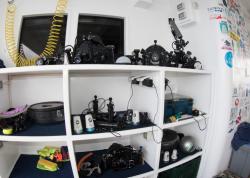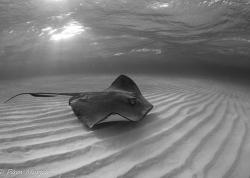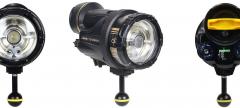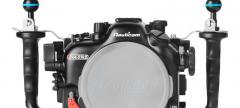Packing Strategies for the Traveling Underwater Photographer
Checked Bags
To an extent, excess luggage problems can usually be overcome by paying for extra bags or paying luggage over-weight fees. Or, you could upgrade to business class, which usually includes more liberal luggage allowances. Of course this approach will cost you, either in cash or miles or both.
One obvious way to reduce the weight of checked bags is by thinning out the contents. This may require some hard choices, but chances are you can lose at least a few items without adversely affecting your trip. At least for tropical destinations, I consider clothes a very low priority. A good rule of thumb is to organize all that you anticipate needing, then reduce that amount by half. Also remember that most resorts and even some live-aboards offer laundry service, so you needn’t bring a full week’s wardrobe. Or, if you’re a penny-pincher like me, bring a small bag of laundry powder and wash your own clothes in a bucket or sink. This may not be suited to most live-aboards, but is a great option if you’re land-based. And unless you’re heading to a very remote place, things like shampoo, soap and toothpaste are usually available at your destination—no need to bring more than a few day’s worth.

Packing underwater photography gear
When it comes to photo gear, one of the many advantages of the digital revolution is a trend towards lighter, more compact gear. Nowadays there are a number of compact, lightweight still and video camera rigs that are capable of taking amazingly good images. SLR shooters must still contend with relatively heavy housings, but at least there’s a new generation of small, lightweight strobes that perform very well in most shooting situations.
Another consideration is the bags themselves, which can account for a sizable portion of allowable weight. While it’s hard to beat a sturdy watertight case for protection, there are a number of lighter weight alternatives that are still fairly robust, such as this front-loading backpack with dividers for camera gear. You might even consider what I use—a standard, inexpensive picnic cooler fitted with a locking hasp.
Also, an increasing number of dive operators now offer quality rental gear, so you may want to think about leaving some or all of your dive gear at home. In fact, some operators provide dive gear and even computers free of charge!
Carry-on strategy
My personal carry-on strategy is constantly evolving, and also varies somewhat depending on my destination. For most flights, I travel with cameras inside their housings in my primary carry-on, and take my laptop in a sleek computer backpack as my "small personal item” or “SPI." In some places, however, airlines are very serious about one carry-on only, and make no allowance for an additional "SPI," so be prepared to adjust accordingly.
For the last few years, my primary carry-on has been a regulation-size roll-away, one side being a fabric, zippered main compartment “door." The fabric component provides a little stretch, allowing me to pack 2 housings & cameras with dome ports, optical viewfinder, chargers, sync. cables, hard drives and various accessories. The whole package doesn’t appear any larger than standard carry-ons, but naturally weight can be an issue depending on what’s allowed. Thankfully it’s still fairly unusual for carry-ons to be weighed, but it’s worth doing whatever you can to avoid that possibility at check-in. If you’re not traveling alone, try to keep such items out of sight of the ticket agent by asking a companion to watch them while you complete the check-in process. It’s not fool-proof, but usually works very well.
If you’re inclined to push the envelope on weight or the airline’s baggage policies are unclear, try to have a contingency plan. One that’s worth considering is packing an extra soft bag that’s easily accessed at the airport. This way you’ll have more options for separating delicate from non-critical gear at check-in, in case you’re forced to check some of your carry-on items.

My secret weapon for carry-on items
More than anything, however, one “secret weapon” has been indispensable for allowing me to travel with all the essential gear—a photographer’s vest. OK, they do look pretty geeky, but wearing one sure beats leaving important items at home. Even if airlines don't allow a small personal item, I've yet to have anyone object to the vest, which holds an amazing amount of stuff. Apparently the fact that it can be considered clothing makes it part of your person, rather than an additional item. So I take full advantage of this, and fill those pockets with a wide assortment of lenses, hard drives, and accessories... anything that is delicate, expensive, or heavy, but still compact. By doing so, I'm able to take pretty much all my most delicate stuff as carry on, without getting penalized.
One more consideration for videographers and digital photographers: never travel from a dive trip with all your precious images in only one place. Redundancy is crucial! Not only is there a chance of your storage device going missing, there’s also a very real possibility of data corruption or loss due to, say, your hard drive being dropped. Whether you keep your images on DVD’s, portable hard drives or some other device, make sure you have at least 2 copies, stored in 2 different bags, at least one of which is a carry-on.
International dive travel inevitably involves some hassles from time to time, especially with camera gear. There may even be moments when you wonder if it’s worth it. However, with a bit of planning and creativity those inconveniences will quickly fade, replaced by fond memories of your travel experiences, and hopefully some great images too.
Editors note: There is some great information out there about which vest to choose. Here's a great article that you may find useful.
Further Reading
RECOMMENDED ARTICLES
SUPPORT THE UNDERWATER PHOTOGRAPHY GUIDE:
The Best Service & Prices on u/w Photo Gear
 Visit Bluewater Photo & Video for all your underwater photography and video gear. Click, or call the team at (310) 633-5052 for expert advice!
Visit Bluewater Photo & Video for all your underwater photography and video gear. Click, or call the team at (310) 633-5052 for expert advice!
The Best Pricing, Service & Expert Advice to Book your Dive Trips
 Bluewater Travel is your full-service scuba travel agency. Let our expert advisers plan and book your next dive vacation. Run by divers, for divers.
Bluewater Travel is your full-service scuba travel agency. Let our expert advisers plan and book your next dive vacation. Run by divers, for divers.
































